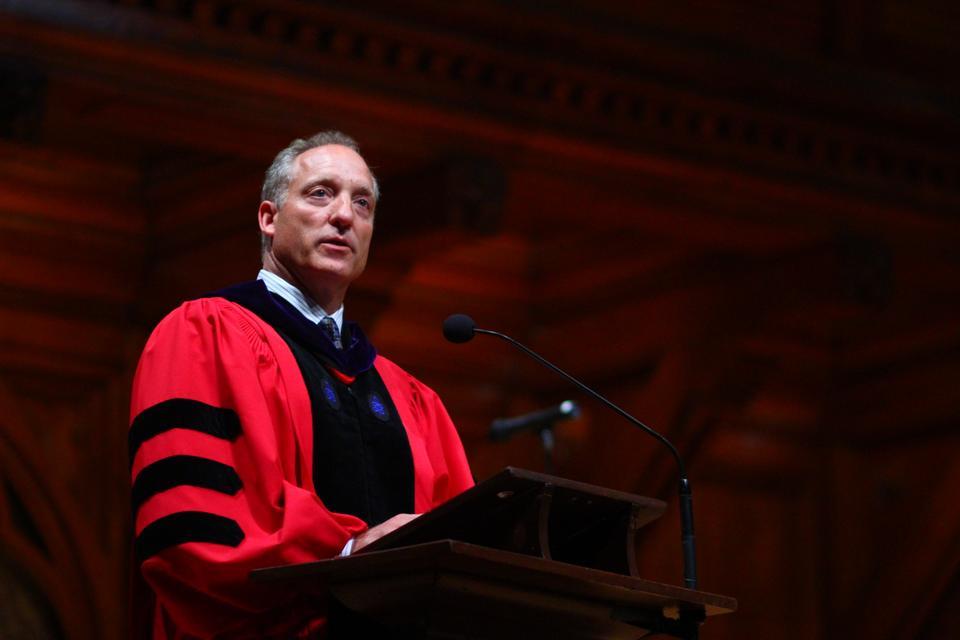
News
Cambridge Residents Slam Council Proposal to Delay Bike Lane Construction

News
‘Gender-Affirming Slay Fest’: Harvard College QSA Hosts Annual Queer Prom

News
‘Not Being Nerds’: Harvard Students Dance to Tinashe at Yardfest

News
Wrongful Death Trial Against CAMHS Employee Over 2015 Student Suicide To Begin Tuesday

News
Cornel West, Harvard Affiliates Call for University to Divest from ‘Israeli Apartheid’ at Rally
Admissions Cuts Concern Some Graduate Students

Recent news that the Faculty of Arts and Sciences will admit 4.4 percent fewer graduate students next year has precipitated concern and disappointment among some current graduate students, who said they were not previously aware of the change.
In an interview with The Crimson last week, FAS Dean Michael D. Smith said that “the drying up of some funds” has forced the Graduate School of Arts and Sciences to reduce the number of students that it will admit next year. The value of Harvard’s endowment dropped by almost $2 billion in fiscal year 2016—a decrease that University administrators warn will “constrain” budgets in the future.

Some graduate students said they worry that the admissions cuts will increase their workload if they have to teach larger undergraduate classes as a result.
“The real question is, how will the university respond to having fewer grad students? said Abigail Weil, a Slavic Languages and Literatures graduate student. “Will we be forced to teach larger sections?”
David A. Nee, a graduate student in the English department, echoed Weil’s concerns. “If they’re not admitting as many graduate students, my concern is that graduate students will have more responsibilities as teaching fellows,” he said.
In an emailed statement, Dean of Undergraduate Education Jay M. Harris wrote that section sizes will not change as a result of the cuts.
"We are not discussing changing section sizes as a matter of policy," Harris wrote.
Smith said last week that the cuts will not affect current graduate students and that FAS will direct resources to students currently on campus before extending admission to new students—a heartening possibility for some graduate students.
“If this allows Harvard to provide more benefits for students who are already in Ph.D. programs, I don’t think that’s all that bad because of concerns with the unions and benefits and pay and all that,” John Froberg, a Molecular Biology graduate student, said.
In an emailed statement, FAS spokesperson Anna Cowenhoven wrote that GSAS will improve the benefits available to students. “Most Ph.D. students now receive a generous financial aid package guaranteed for at least five years, which pays for tuition, fees, health insurance, and other benefits,” she wrote.
Still, some graduate students said they were disappointed with the funding cuts.
“I do find it unfortunate that potential future grad students are the ones paying for this mistake or high-risk investment or whatever actions resulted in the poor returns,” Jean Fan, a Bioinformatics and Integrative Genomics graduate student, said.
Harvard Management Company, which manages the University’s $35.7 billion endowment, returned negative 2 percents on its investments in fiscal year 2016. The endowment’s poor returns, along with decreasing federal research funding and other subdued revenue streams, pose a challenge to Harvard’s budgets for years to come.
“It’s unfortunate that more students won’t have the opportunity to get a Harvard Ph.D.,” said Froberg. “It’s unfortunate that the university is running into financial constraints even though we are the wealthiest university in the world.”
But Nee said that the job market for young academics is so crowded that fewer competitors might be helpful for current students.
“There are so few jobs for Ph.D. students coming out of these programs,” said Nee. “It’s become a regular feature of these programs that students put 6 to 8 years of work into these programs, which is a lot of work, a lot of effort, a lot of time, and then they come out of these programs and there are only 1 or 2 jobs for them across the country in their field.”
Some students said they did not know about the admissions changes before last week.
“They didn’t tell students,” said Wenlong Yang, a Chemistry graduate student. “The students don’t know anything about [admissions cuts].”
In her emailed statement, Cowenhoven outlined the process for setting admissions targets.
“GSAS, FAS, the Divisional Deans, Department Chairs, and Faculty work together to thoughtfully establish admissions targets each year,” she wrote. “These targets are then communicated directly to the Faculty Admission Committee chairs of each degree program.”
Each department calculates the number of graduate students it will admit differently, based on factors such as yield, the number of students, and the number of faculty members in the department. Yang said that he is concerned that the admissions cuts will have a more serious effect on some departments.
“If only a few departments have more reductions in incoming students, that’s a big problem but if everyone does, that’s not a big problem,” said Yang.
The University has not yet decided how many students to admit in future years.
Want to keep up with breaking news? Subscribe to our email newsletter.
